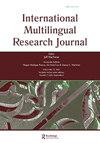The impact of linguistic background on the nature of classroom dyadic interactions: evidence from L2 and L3 learners of English as a foreign language
IF 2.1
1区 文学
Q2 EDUCATION & EDUCATIONAL RESEARCH
引用次数: 0
Abstract
ABSTRACT Framed within the perspective of Vygotskyan sociocultural theory and models of third language learning, this study examined the impact of differing linguistic backgrounds and learning experience on the nature of dyadic interaction during task completion in the divide between true L2 and L3 learners. It was conducted in an EFL classroom with eight leaners of English as first and eight learners of English as second foreign language after French. Their measured English proficiency corresponded to A2 level. They were presented with two similar grammar-based tasks on sessions 11 and 12 with different pairing configurations and an isomorphic version of both tasks on session 13 to be completed individually. Data from pair talks and individual performances were analyzed in three stages to: a) find the major factors distinguishing the quality of interactions, b) compare the quality of L2ers and L3ers’ interactions when they were matched or mixed, and c) examine the learning benefits of the interactions across L2ers and L3ers in terms of transferring knowledge from interactions to their subsequent individual productions. The findings indicated a role for linguistic background in mediating the nature of pair interactions and shaping dyadic relationships by impacting L2ers and L3ers’ perception of each other’s proficiency.语言背景对课堂二元互动性质的影响:来自二语和三语英语作为外语学习者的证据
摘要在维果茨基社会文化理论和第三语言学习模式的框架下,本研究考察了不同的语言背景和学习经历对真正的二语和三语学习者在完成任务过程中二元互动性质的影响。它是在一个英语课堂上进行的,八名英语学习者作为第一外语,八名学习者作为仅次于法语的第二外语。他们测量的英语水平相当于A2水平。他们在会话11和12上被呈现了两个类似的基于语法的任务,具有不同的配对配置,并且在会话13上这两个任务的同构版本将被单独完成。从配对对话和个人表现的数据分三个阶段进行分析:a)找出区分互动质量的主要因素,b)比较L2ers和L3ers在匹配或混合时的互动质量,以及c)从将知识从交互转移到其后续的个体生产的角度来检验L2和L3之间的交互的学习益处。研究结果表明,语言背景通过影响二年级和三年级学生对彼此熟练程度的感知,在中介配对互动的性质和塑造二元关系方面发挥了作用。
本文章由计算机程序翻译,如有差异,请以英文原文为准。
求助全文
约1分钟内获得全文
求助全文
来源期刊
CiteScore
4.10
自引率
4.80%
发文量
19
期刊介绍:
The International Multilingual Research Journal (IMRJ) invites scholarly contributions with strong interdisciplinary perspectives to understand and promote bi/multilingualism, bi/multi-literacy, and linguistic democracy. The journal’s focus is on these topics as related to languages other than English as well as dialectal variations of English. It has three thematic emphases: the intersection of language and culture, the dialectics of the local and global, and comparative models within and across contexts. IMRJ is committed to promoting equity, access, and social justice in education, and to offering accessible research and policy analyses to better inform scholars, educators, students, and policy makers. IMRJ is particularly interested in scholarship grounded in interdisciplinary frameworks that offer insights from linguistics, applied linguistics, education, globalization and immigration studies, cultural psychology, linguistic and psychological anthropology, sociolinguistics, literacy studies, post-colonial studies, critical race theory, and critical theory and pedagogy. It seeks theoretical and empirical scholarship with implications for research, policy, and practice. Submissions of research articles based on quantitative, qualitative, and mixed methods are encouraged. The journal includes book reviews and two occasional sections: Perspectives and Research Notes. Perspectives allows for informed debate and exchanges on current issues and hot topics related to bi/multilingualism, bi/multi-literacy, and linguistic democracy from research, practice, and policy perspectives. Research Notes are shorter submissions that provide updates on major research projects and trends in the field.

 求助内容:
求助内容: 应助结果提醒方式:
应助结果提醒方式:


